Law of Contract and Agency
VerifiedAdded on 2023/06/05
|11
|3487
|259
AI Summary
This article discusses the law of contract and agency in relation to two different case scenarios. It covers the related issues, concerned law, and application of related law.
Contribute Materials
Your contribution can guide someone’s learning journey. Share your
documents today.
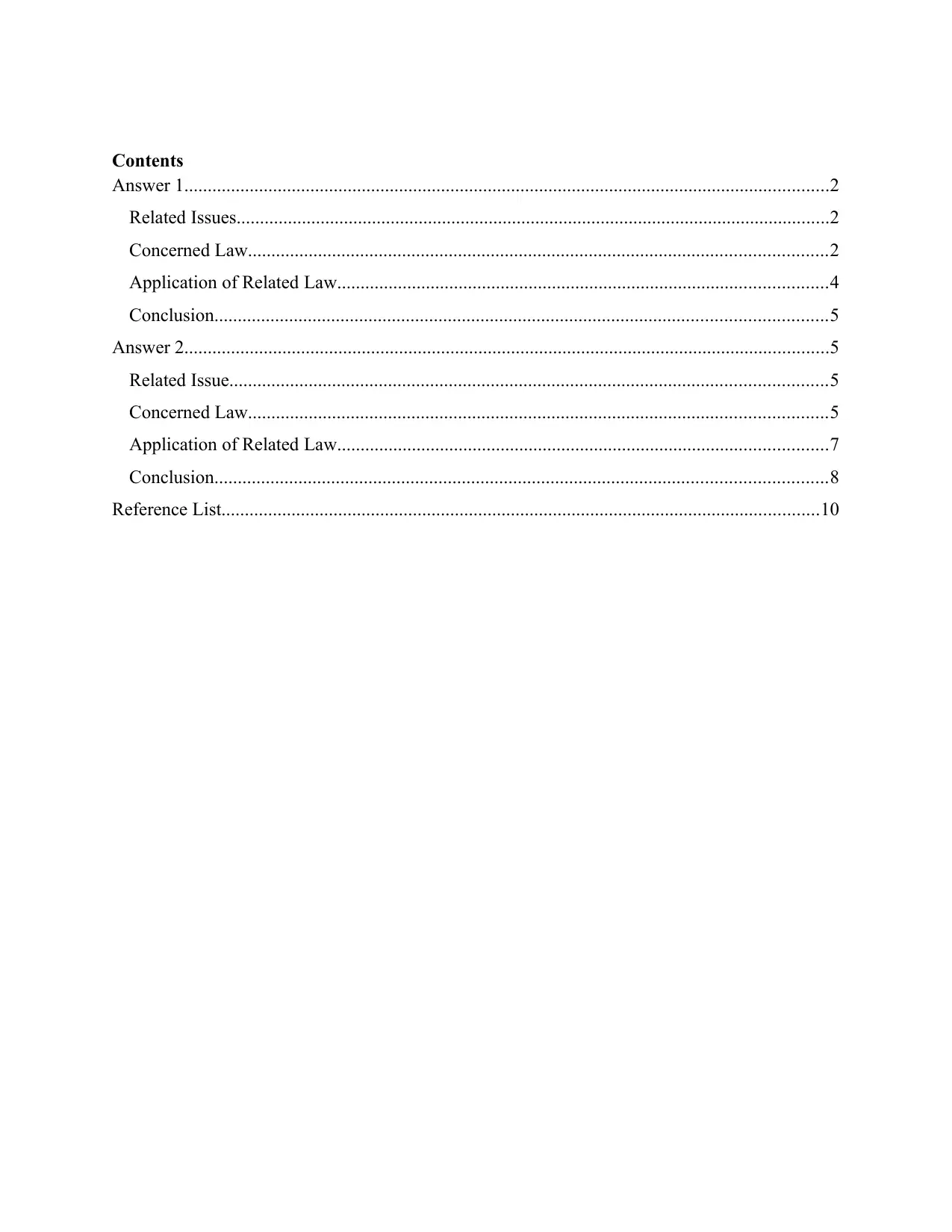
Contents
Answer 1..........................................................................................................................................2
Related Issues...............................................................................................................................2
Concerned Law............................................................................................................................2
Application of Related Law.........................................................................................................4
Conclusion...................................................................................................................................5
Answer 2..........................................................................................................................................5
Related Issue................................................................................................................................5
Concerned Law............................................................................................................................5
Application of Related Law.........................................................................................................7
Conclusion...................................................................................................................................8
Reference List................................................................................................................................10
Answer 1..........................................................................................................................................2
Related Issues...............................................................................................................................2
Concerned Law............................................................................................................................2
Application of Related Law.........................................................................................................4
Conclusion...................................................................................................................................5
Answer 2..........................................................................................................................................5
Related Issue................................................................................................................................5
Concerned Law............................................................................................................................5
Application of Related Law.........................................................................................................7
Conclusion...................................................................................................................................8
Reference List................................................................................................................................10
Secure Best Marks with AI Grader
Need help grading? Try our AI Grader for instant feedback on your assignments.
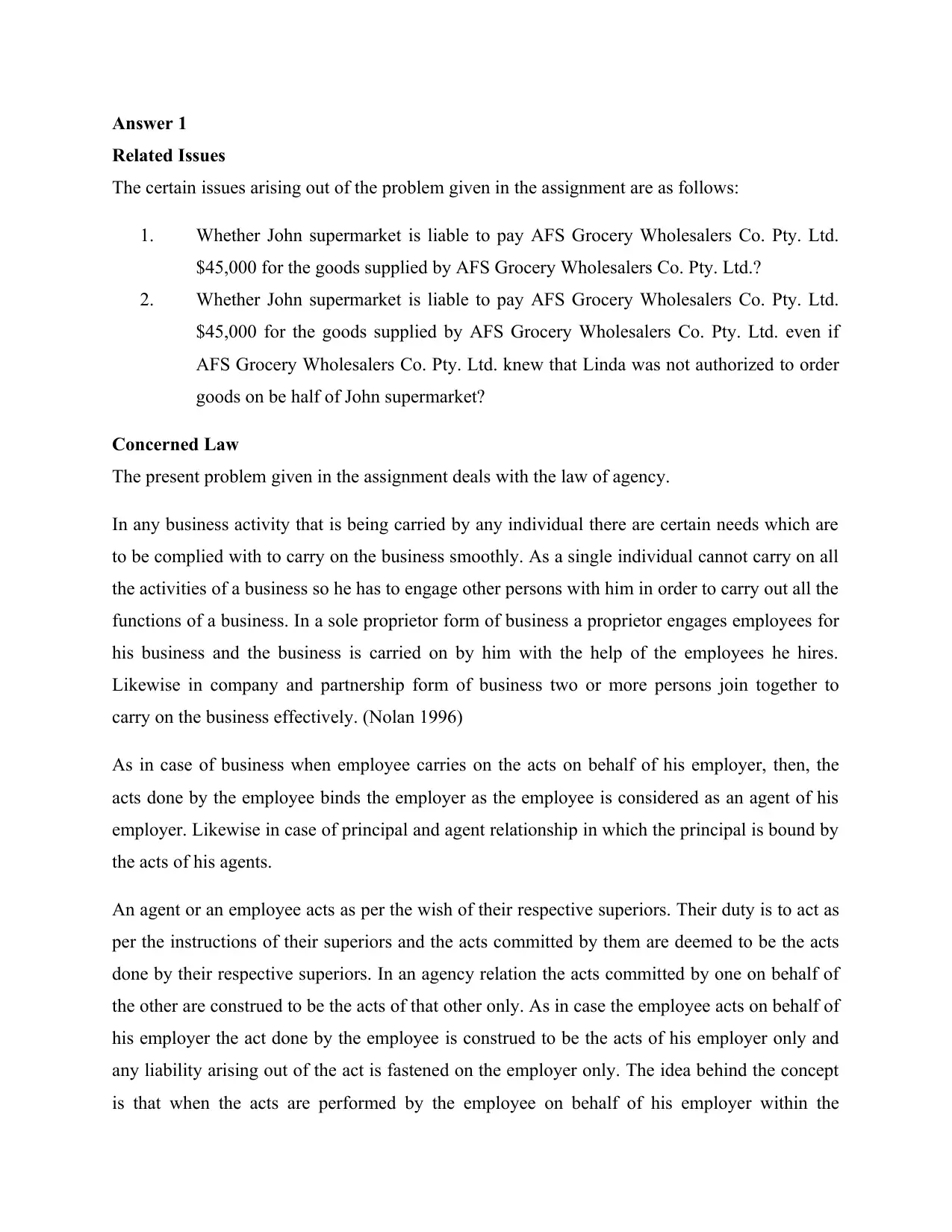
Answer 1
Related Issues
The certain issues arising out of the problem given in the assignment are as follows:
1. Whether John supermarket is liable to pay AFS Grocery Wholesalers Co. Pty. Ltd.
$45,000 for the goods supplied by AFS Grocery Wholesalers Co. Pty. Ltd.?
2. Whether John supermarket is liable to pay AFS Grocery Wholesalers Co. Pty. Ltd.
$45,000 for the goods supplied by AFS Grocery Wholesalers Co. Pty. Ltd. even if
AFS Grocery Wholesalers Co. Pty. Ltd. knew that Linda was not authorized to order
goods on be half of John supermarket?
Concerned Law
The present problem given in the assignment deals with the law of agency.
In any business activity that is being carried by any individual there are certain needs which are
to be complied with to carry on the business smoothly. As a single individual cannot carry on all
the activities of a business so he has to engage other persons with him in order to carry out all the
functions of a business. In a sole proprietor form of business a proprietor engages employees for
his business and the business is carried on by him with the help of the employees he hires.
Likewise in company and partnership form of business two or more persons join together to
carry on the business effectively. (Nolan 1996)
As in case of business when employee carries on the acts on behalf of his employer, then, the
acts done by the employee binds the employer as the employee is considered as an agent of his
employer. Likewise in case of principal and agent relationship in which the principal is bound by
the acts of his agents.
An agent or an employee acts as per the wish of their respective superiors. Their duty is to act as
per the instructions of their superiors and the acts committed by them are deemed to be the acts
done by their respective superiors. In an agency relation the acts committed by one on behalf of
the other are construed to be the acts of that other only. As in case the employee acts on behalf of
his employer the act done by the employee is construed to be the acts of his employer only and
any liability arising out of the act is fastened on the employer only. The idea behind the concept
is that when the acts are performed by the employee on behalf of his employer within the
Related Issues
The certain issues arising out of the problem given in the assignment are as follows:
1. Whether John supermarket is liable to pay AFS Grocery Wholesalers Co. Pty. Ltd.
$45,000 for the goods supplied by AFS Grocery Wholesalers Co. Pty. Ltd.?
2. Whether John supermarket is liable to pay AFS Grocery Wholesalers Co. Pty. Ltd.
$45,000 for the goods supplied by AFS Grocery Wholesalers Co. Pty. Ltd. even if
AFS Grocery Wholesalers Co. Pty. Ltd. knew that Linda was not authorized to order
goods on be half of John supermarket?
Concerned Law
The present problem given in the assignment deals with the law of agency.
In any business activity that is being carried by any individual there are certain needs which are
to be complied with to carry on the business smoothly. As a single individual cannot carry on all
the activities of a business so he has to engage other persons with him in order to carry out all the
functions of a business. In a sole proprietor form of business a proprietor engages employees for
his business and the business is carried on by him with the help of the employees he hires.
Likewise in company and partnership form of business two or more persons join together to
carry on the business effectively. (Nolan 1996)
As in case of business when employee carries on the acts on behalf of his employer, then, the
acts done by the employee binds the employer as the employee is considered as an agent of his
employer. Likewise in case of principal and agent relationship in which the principal is bound by
the acts of his agents.
An agent or an employee acts as per the wish of their respective superiors. Their duty is to act as
per the instructions of their superiors and the acts committed by them are deemed to be the acts
done by their respective superiors. In an agency relation the acts committed by one on behalf of
the other are construed to be the acts of that other only. As in case the employee acts on behalf of
his employer the act done by the employee is construed to be the acts of his employer only and
any liability arising out of the act is fastened on the employer only. The idea behind the concept
is that when the acts are performed by the employee on behalf of his employer within the
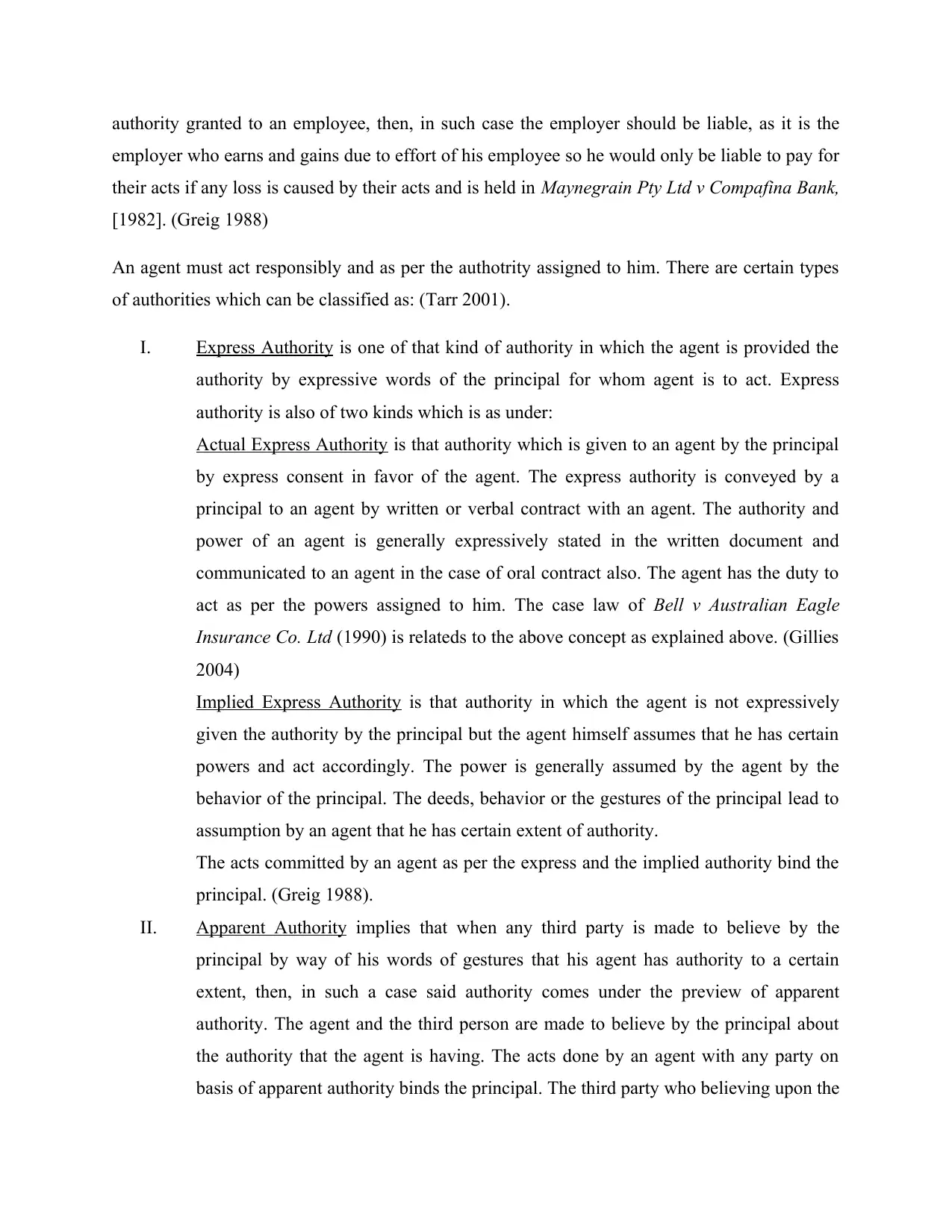
authority granted to an employee, then, in such case the employer should be liable, as it is the
employer who earns and gains due to effort of his employee so he would only be liable to pay for
their acts if any loss is caused by their acts and is held in Maynegrain Pty Ltd v Compafina Bank,
[1982]. (Greig 1988)
An agent must act responsibly and as per the authotrity assigned to him. There are certain types
of authorities which can be classified as: (Tarr 2001).
I. Express Authority is one of that kind of authority in which the agent is provided the
authority by expressive words of the principal for whom agent is to act. Express
authority is also of two kinds which is as under:
Actual Express Authority is that authority which is given to an agent by the principal
by express consent in favor of the agent. The express authority is conveyed by a
principal to an agent by written or verbal contract with an agent. The authority and
power of an agent is generally expressively stated in the written document and
communicated to an agent in the case of oral contract also. The agent has the duty to
act as per the powers assigned to him. The case law of Bell v Australian Eagle
Insurance Co. Ltd (1990) is relateds to the above concept as explained above. (Gillies
2004)
Implied Express Authority is that authority in which the agent is not expressively
given the authority by the principal but the agent himself assumes that he has certain
powers and act accordingly. The power is generally assumed by the agent by the
behavior of the principal. The deeds, behavior or the gestures of the principal lead to
assumption by an agent that he has certain extent of authority.
The acts committed by an agent as per the express and the implied authority bind the
principal. (Greig 1988).
II. Apparent Authority implies that when any third party is made to believe by the
principal by way of his words of gestures that his agent has authority to a certain
extent, then, in such a case said authority comes under the preview of apparent
authority. The agent and the third person are made to believe by the principal about
the authority that the agent is having. The acts done by an agent with any party on
basis of apparent authority binds the principal. The third party who believing upon the
employer who earns and gains due to effort of his employee so he would only be liable to pay for
their acts if any loss is caused by their acts and is held in Maynegrain Pty Ltd v Compafina Bank,
[1982]. (Greig 1988)
An agent must act responsibly and as per the authotrity assigned to him. There are certain types
of authorities which can be classified as: (Tarr 2001).
I. Express Authority is one of that kind of authority in which the agent is provided the
authority by expressive words of the principal for whom agent is to act. Express
authority is also of two kinds which is as under:
Actual Express Authority is that authority which is given to an agent by the principal
by express consent in favor of the agent. The express authority is conveyed by a
principal to an agent by written or verbal contract with an agent. The authority and
power of an agent is generally expressively stated in the written document and
communicated to an agent in the case of oral contract also. The agent has the duty to
act as per the powers assigned to him. The case law of Bell v Australian Eagle
Insurance Co. Ltd (1990) is relateds to the above concept as explained above. (Gillies
2004)
Implied Express Authority is that authority in which the agent is not expressively
given the authority by the principal but the agent himself assumes that he has certain
powers and act accordingly. The power is generally assumed by the agent by the
behavior of the principal. The deeds, behavior or the gestures of the principal lead to
assumption by an agent that he has certain extent of authority.
The acts committed by an agent as per the express and the implied authority bind the
principal. (Greig 1988).
II. Apparent Authority implies that when any third party is made to believe by the
principal by way of his words of gestures that his agent has authority to a certain
extent, then, in such a case said authority comes under the preview of apparent
authority. The agent and the third person are made to believe by the principal about
the authority that the agent is having. The acts done by an agent with any party on
basis of apparent authority binds the principal. The third party who believing upon the
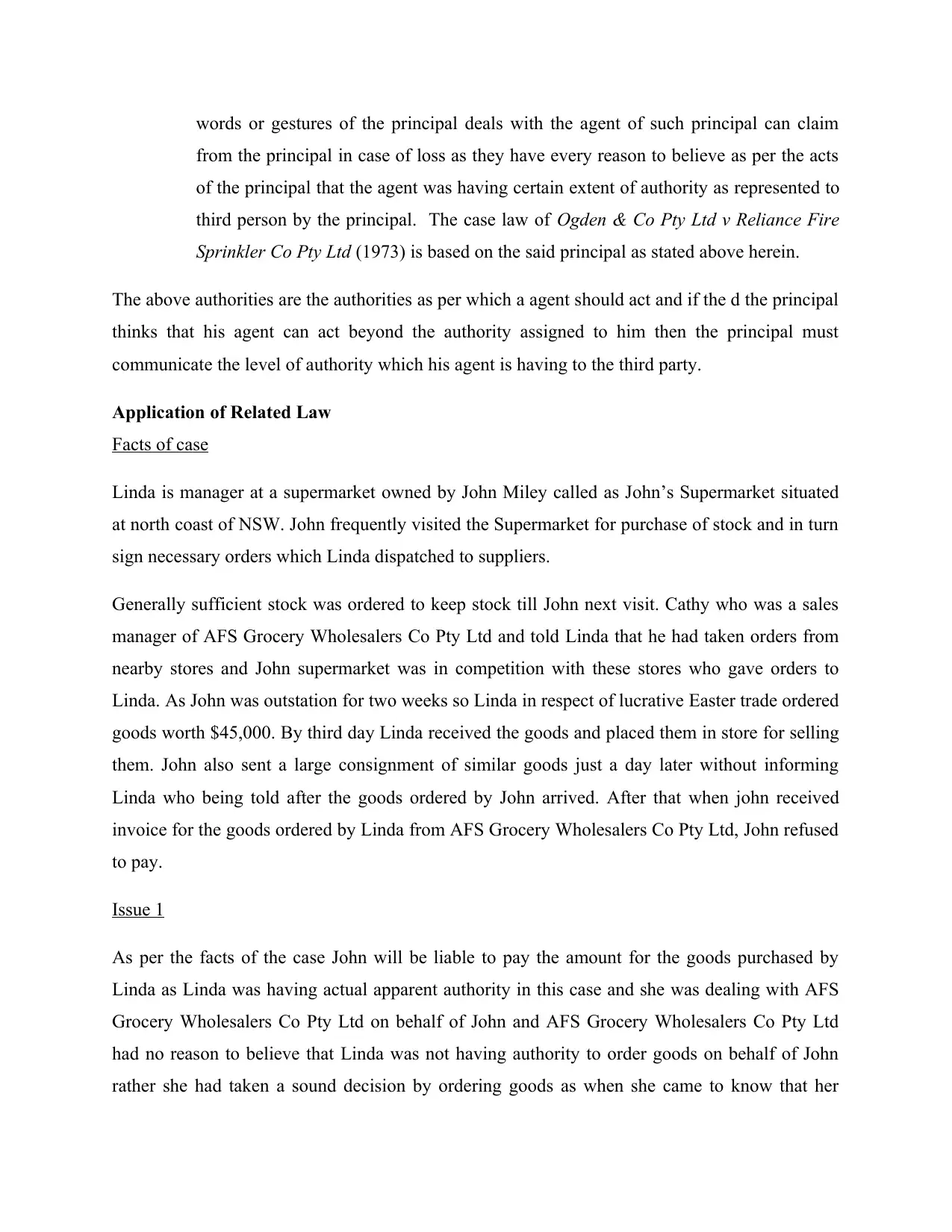
words or gestures of the principal deals with the agent of such principal can claim
from the principal in case of loss as they have every reason to believe as per the acts
of the principal that the agent was having certain extent of authority as represented to
third person by the principal. The case law of Ogden & Co Pty Ltd v Reliance Fire
Sprinkler Co Pty Ltd (1973) is based on the said principal as stated above herein.
The above authorities are the authorities as per which a agent should act and if the d the principal
thinks that his agent can act beyond the authority assigned to him then the principal must
communicate the level of authority which his agent is having to the third party.
Application of Related Law
Facts of case
Linda is manager at a supermarket owned by John Miley called as John’s Supermarket situated
at north coast of NSW. John frequently visited the Supermarket for purchase of stock and in turn
sign necessary orders which Linda dispatched to suppliers.
Generally sufficient stock was ordered to keep stock till John next visit. Cathy who was a sales
manager of AFS Grocery Wholesalers Co Pty Ltd and told Linda that he had taken orders from
nearby stores and John supermarket was in competition with these stores who gave orders to
Linda. As John was outstation for two weeks so Linda in respect of lucrative Easter trade ordered
goods worth $45,000. By third day Linda received the goods and placed them in store for selling
them. John also sent a large consignment of similar goods just a day later without informing
Linda who being told after the goods ordered by John arrived. After that when john received
invoice for the goods ordered by Linda from AFS Grocery Wholesalers Co Pty Ltd, John refused
to pay.
Issue 1
As per the facts of the case John will be liable to pay the amount for the goods purchased by
Linda as Linda was having actual apparent authority in this case and she was dealing with AFS
Grocery Wholesalers Co Pty Ltd on behalf of John and AFS Grocery Wholesalers Co Pty Ltd
had no reason to believe that Linda was not having authority to order goods on behalf of John
rather she had taken a sound decision by ordering goods as when she came to know that her
from the principal in case of loss as they have every reason to believe as per the acts
of the principal that the agent was having certain extent of authority as represented to
third person by the principal. The case law of Ogden & Co Pty Ltd v Reliance Fire
Sprinkler Co Pty Ltd (1973) is based on the said principal as stated above herein.
The above authorities are the authorities as per which a agent should act and if the d the principal
thinks that his agent can act beyond the authority assigned to him then the principal must
communicate the level of authority which his agent is having to the third party.
Application of Related Law
Facts of case
Linda is manager at a supermarket owned by John Miley called as John’s Supermarket situated
at north coast of NSW. John frequently visited the Supermarket for purchase of stock and in turn
sign necessary orders which Linda dispatched to suppliers.
Generally sufficient stock was ordered to keep stock till John next visit. Cathy who was a sales
manager of AFS Grocery Wholesalers Co Pty Ltd and told Linda that he had taken orders from
nearby stores and John supermarket was in competition with these stores who gave orders to
Linda. As John was outstation for two weeks so Linda in respect of lucrative Easter trade ordered
goods worth $45,000. By third day Linda received the goods and placed them in store for selling
them. John also sent a large consignment of similar goods just a day later without informing
Linda who being told after the goods ordered by John arrived. After that when john received
invoice for the goods ordered by Linda from AFS Grocery Wholesalers Co Pty Ltd, John refused
to pay.
Issue 1
As per the facts of the case John will be liable to pay the amount for the goods purchased by
Linda as Linda was having actual apparent authority in this case and she was dealing with AFS
Grocery Wholesalers Co Pty Ltd on behalf of John and AFS Grocery Wholesalers Co Pty Ltd
had no reason to believe that Linda was not having authority to order goods on behalf of John
rather she had taken a sound decision by ordering goods as when she came to know that her
Secure Best Marks with AI Grader
Need help grading? Try our AI Grader for instant feedback on your assignments.
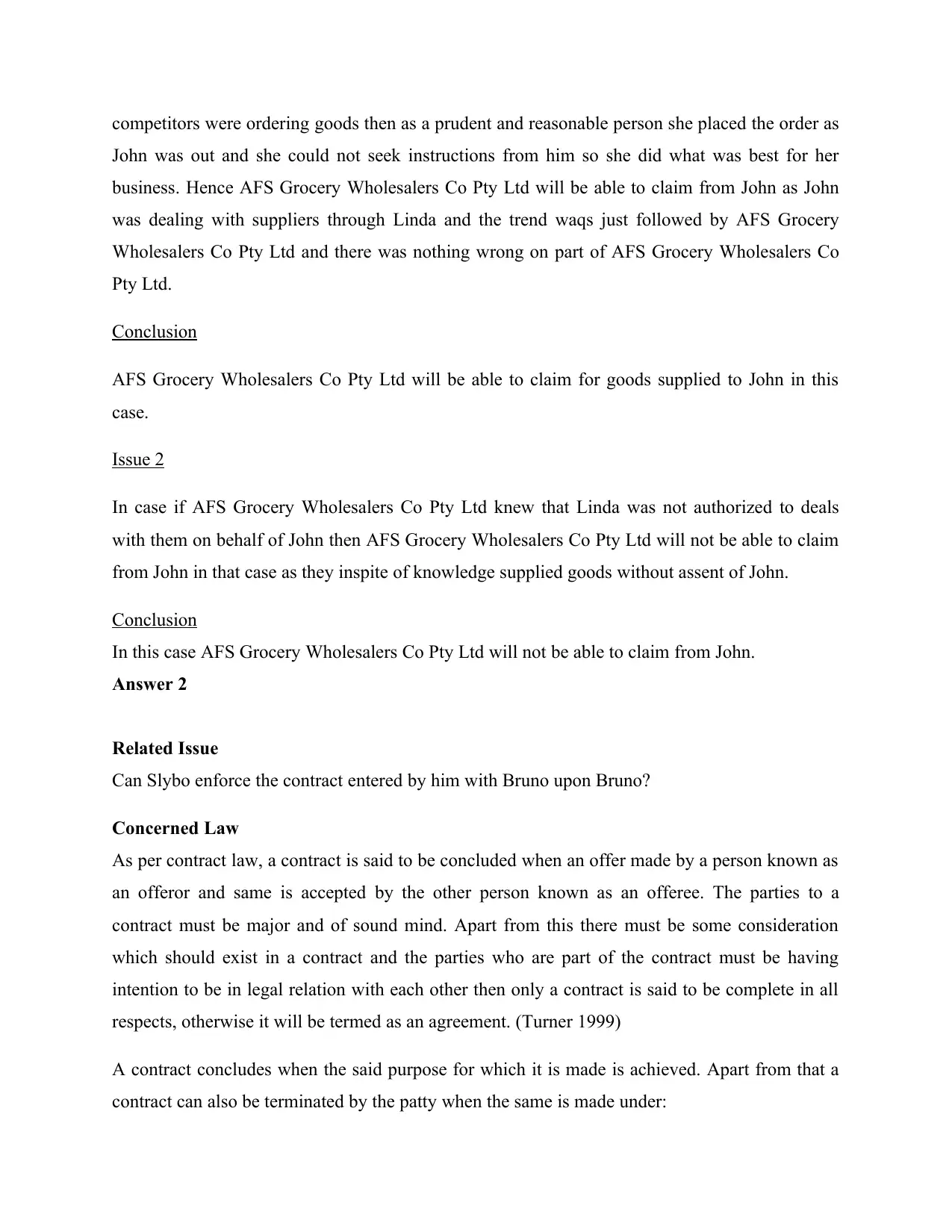
competitors were ordering goods then as a prudent and reasonable person she placed the order as
John was out and she could not seek instructions from him so she did what was best for her
business. Hence AFS Grocery Wholesalers Co Pty Ltd will be able to claim from John as John
was dealing with suppliers through Linda and the trend waqs just followed by AFS Grocery
Wholesalers Co Pty Ltd and there was nothing wrong on part of AFS Grocery Wholesalers Co
Pty Ltd.
Conclusion
AFS Grocery Wholesalers Co Pty Ltd will be able to claim for goods supplied to John in this
case.
Issue 2
In case if AFS Grocery Wholesalers Co Pty Ltd knew that Linda was not authorized to deals
with them on behalf of John then AFS Grocery Wholesalers Co Pty Ltd will not be able to claim
from John in that case as they inspite of knowledge supplied goods without assent of John.
Conclusion
In this case AFS Grocery Wholesalers Co Pty Ltd will not be able to claim from John.
Answer 2
Related Issue
Can Slybo enforce the contract entered by him with Bruno upon Bruno?
Concerned Law
As per contract law, a contract is said to be concluded when an offer made by a person known as
an offeror and same is accepted by the other person known as an offeree. The parties to a
contract must be major and of sound mind. Apart from this there must be some consideration
which should exist in a contract and the parties who are part of the contract must be having
intention to be in legal relation with each other then only a contract is said to be complete in all
respects, otherwise it will be termed as an agreement. (Turner 1999)
A contract concludes when the said purpose for which it is made is achieved. Apart from that a
contract can also be terminated by the patty when the same is made under:
John was out and she could not seek instructions from him so she did what was best for her
business. Hence AFS Grocery Wholesalers Co Pty Ltd will be able to claim from John as John
was dealing with suppliers through Linda and the trend waqs just followed by AFS Grocery
Wholesalers Co Pty Ltd and there was nothing wrong on part of AFS Grocery Wholesalers Co
Pty Ltd.
Conclusion
AFS Grocery Wholesalers Co Pty Ltd will be able to claim for goods supplied to John in this
case.
Issue 2
In case if AFS Grocery Wholesalers Co Pty Ltd knew that Linda was not authorized to deals
with them on behalf of John then AFS Grocery Wholesalers Co Pty Ltd will not be able to claim
from John in that case as they inspite of knowledge supplied goods without assent of John.
Conclusion
In this case AFS Grocery Wholesalers Co Pty Ltd will not be able to claim from John.
Answer 2
Related Issue
Can Slybo enforce the contract entered by him with Bruno upon Bruno?
Concerned Law
As per contract law, a contract is said to be concluded when an offer made by a person known as
an offeror and same is accepted by the other person known as an offeree. The parties to a
contract must be major and of sound mind. Apart from this there must be some consideration
which should exist in a contract and the parties who are part of the contract must be having
intention to be in legal relation with each other then only a contract is said to be complete in all
respects, otherwise it will be termed as an agreement. (Turner 1999)
A contract concludes when the said purpose for which it is made is achieved. Apart from that a
contract can also be terminated by the patty when the same is made under:
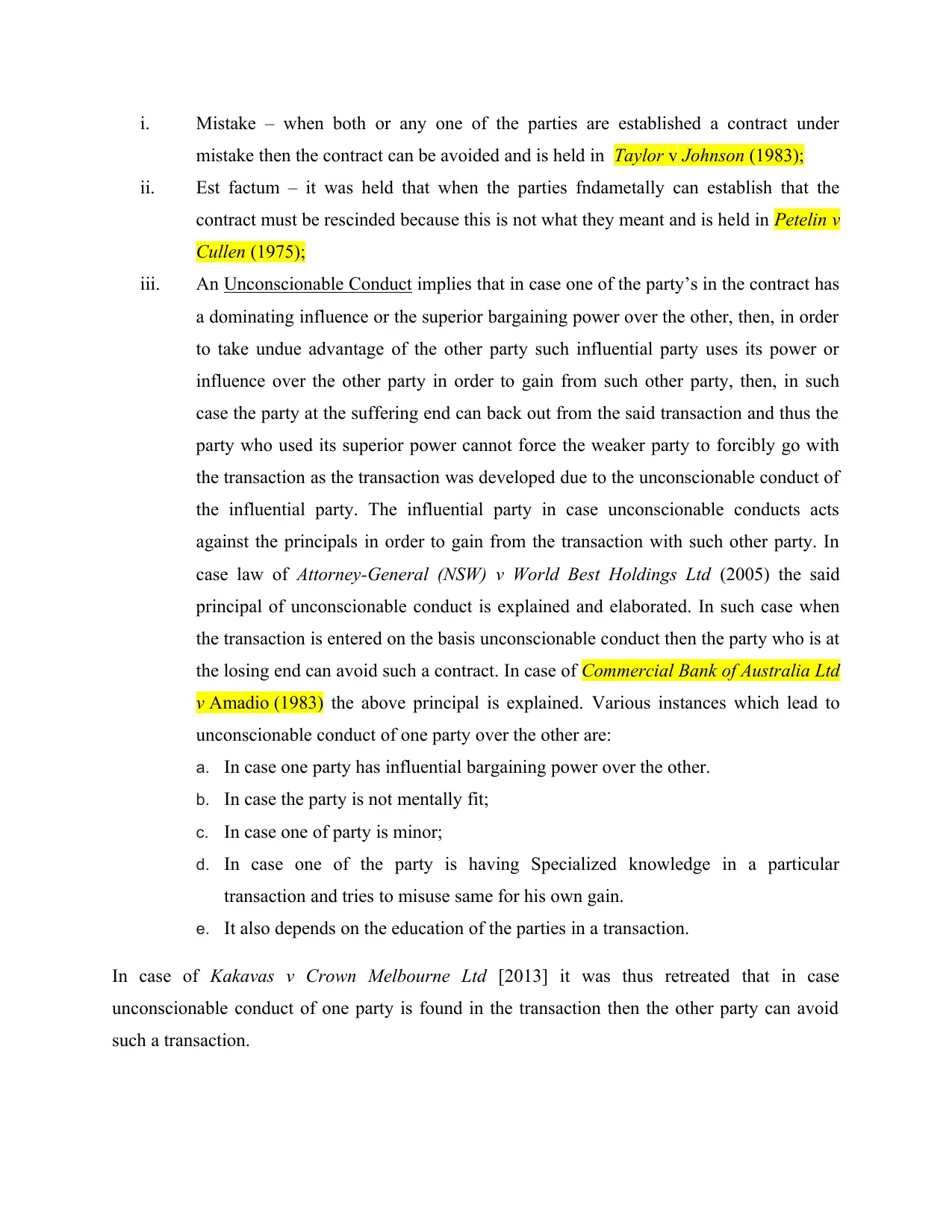
i. Mistake – when both or any one of the parties are established a contract under
mistake then the contract can be avoided and is held in Taylor v Johnson (1983);
ii. Est factum – it was held that when the parties fndametally can establish that the
contract must be rescinded because this is not what they meant and is held in Petelin v
Cullen (1975);
iii. An Unconscionable Conduct implies that in case one of the party’s in the contract has
a dominating influence or the superior bargaining power over the other, then, in order
to take undue advantage of the other party such influential party uses its power or
influence over the other party in order to gain from such other party, then, in such
case the party at the suffering end can back out from the said transaction and thus the
party who used its superior power cannot force the weaker party to forcibly go with
the transaction as the transaction was developed due to the unconscionable conduct of
the influential party. The influential party in case unconscionable conducts acts
against the principals in order to gain from the transaction with such other party. In
case law of Attorney-General (NSW) v World Best Holdings Ltd (2005) the said
principal of unconscionable conduct is explained and elaborated. In such case when
the transaction is entered on the basis unconscionable conduct then the party who is at
the losing end can avoid such a contract. In case of Commercial Bank of Australia Ltd
v Amadio (1983) the above principal is explained. Various instances which lead to
unconscionable conduct of one party over the other are:
a. In case one party has influential bargaining power over the other.
b. In case the party is not mentally fit;
c. In case one of party is minor;
d. In case one of the party is having Specialized knowledge in a particular
transaction and tries to misuse same for his own gain.
e. It also depends on the education of the parties in a transaction.
In case of Kakavas v Crown Melbourne Ltd [2013] it was thus retreated that in case
unconscionable conduct of one party is found in the transaction then the other party can avoid
such a transaction.
mistake then the contract can be avoided and is held in Taylor v Johnson (1983);
ii. Est factum – it was held that when the parties fndametally can establish that the
contract must be rescinded because this is not what they meant and is held in Petelin v
Cullen (1975);
iii. An Unconscionable Conduct implies that in case one of the party’s in the contract has
a dominating influence or the superior bargaining power over the other, then, in order
to take undue advantage of the other party such influential party uses its power or
influence over the other party in order to gain from such other party, then, in such
case the party at the suffering end can back out from the said transaction and thus the
party who used its superior power cannot force the weaker party to forcibly go with
the transaction as the transaction was developed due to the unconscionable conduct of
the influential party. The influential party in case unconscionable conducts acts
against the principals in order to gain from the transaction with such other party. In
case law of Attorney-General (NSW) v World Best Holdings Ltd (2005) the said
principal of unconscionable conduct is explained and elaborated. In such case when
the transaction is entered on the basis unconscionable conduct then the party who is at
the losing end can avoid such a contract. In case of Commercial Bank of Australia Ltd
v Amadio (1983) the above principal is explained. Various instances which lead to
unconscionable conduct of one party over the other are:
a. In case one party has influential bargaining power over the other.
b. In case the party is not mentally fit;
c. In case one of party is minor;
d. In case one of the party is having Specialized knowledge in a particular
transaction and tries to misuse same for his own gain.
e. It also depends on the education of the parties in a transaction.
In case of Kakavas v Crown Melbourne Ltd [2013] it was thus retreated that in case
unconscionable conduct of one party is found in the transaction then the other party can avoid
such a transaction.
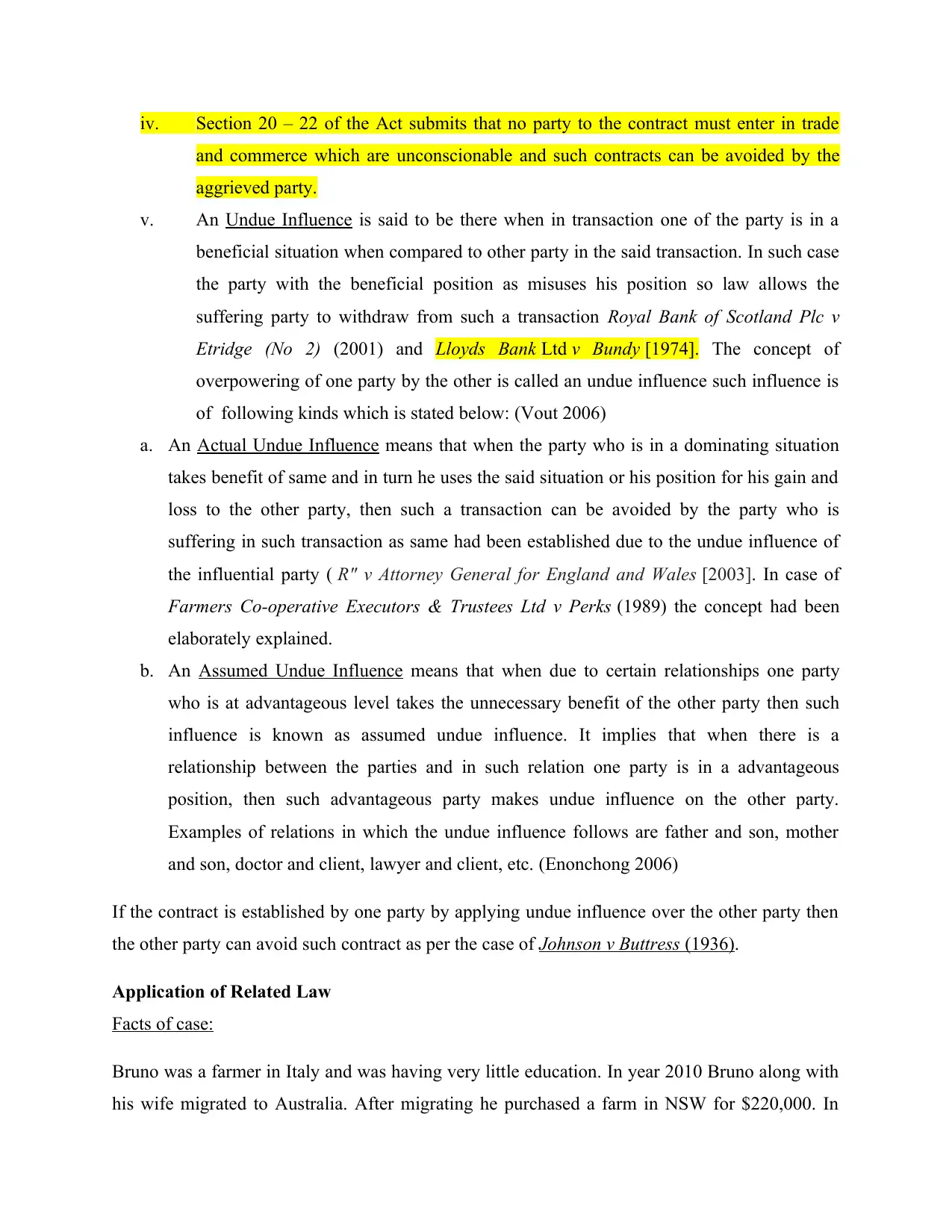
iv. Section 20 – 22 of the Act submits that no party to the contract must enter in trade
and commerce which are unconscionable and such contracts can be avoided by the
aggrieved party.
v. An Undue Influence is said to be there when in transaction one of the party is in a
beneficial situation when compared to other party in the said transaction. In such case
the party with the beneficial position as misuses his position so law allows the
suffering party to withdraw from such a transaction Royal Bank of Scotland Plc v
Etridge (No 2) (2001) and Lloyds Bank Ltd v Bundy [1974]. The concept of
overpowering of one party by the other is called an undue influence such influence is
of following kinds which is stated below: (Vout 2006)
a. An Actual Undue Influence means that when the party who is in a dominating situation
takes benefit of same and in turn he uses the said situation or his position for his gain and
loss to the other party, then such a transaction can be avoided by the party who is
suffering in such transaction as same had been established due to the undue influence of
the influential party ( R" v Attorney General for England and Wales [2003]. In case of
Farmers Co-operative Executors & Trustees Ltd v Perks (1989) the concept had been
elaborately explained.
b. An Assumed Undue Influence means that when due to certain relationships one party
who is at advantageous level takes the unnecessary benefit of the other party then such
influence is known as assumed undue influence. It implies that when there is a
relationship between the parties and in such relation one party is in a advantageous
position, then such advantageous party makes undue influence on the other party.
Examples of relations in which the undue influence follows are father and son, mother
and son, doctor and client, lawyer and client, etc. (Enonchong 2006)
If the contract is established by one party by applying undue influence over the other party then
the other party can avoid such contract as per the case of Johnson v Buttress (1936).
Application of Related Law
Facts of case:
Bruno was a farmer in Italy and was having very little education. In year 2010 Bruno along with
his wife migrated to Australia. After migrating he purchased a farm in NSW for $220,000. In
and commerce which are unconscionable and such contracts can be avoided by the
aggrieved party.
v. An Undue Influence is said to be there when in transaction one of the party is in a
beneficial situation when compared to other party in the said transaction. In such case
the party with the beneficial position as misuses his position so law allows the
suffering party to withdraw from such a transaction Royal Bank of Scotland Plc v
Etridge (No 2) (2001) and Lloyds Bank Ltd v Bundy [1974]. The concept of
overpowering of one party by the other is called an undue influence such influence is
of following kinds which is stated below: (Vout 2006)
a. An Actual Undue Influence means that when the party who is in a dominating situation
takes benefit of same and in turn he uses the said situation or his position for his gain and
loss to the other party, then such a transaction can be avoided by the party who is
suffering in such transaction as same had been established due to the undue influence of
the influential party ( R" v Attorney General for England and Wales [2003]. In case of
Farmers Co-operative Executors & Trustees Ltd v Perks (1989) the concept had been
elaborately explained.
b. An Assumed Undue Influence means that when due to certain relationships one party
who is at advantageous level takes the unnecessary benefit of the other party then such
influence is known as assumed undue influence. It implies that when there is a
relationship between the parties and in such relation one party is in a advantageous
position, then such advantageous party makes undue influence on the other party.
Examples of relations in which the undue influence follows are father and son, mother
and son, doctor and client, lawyer and client, etc. (Enonchong 2006)
If the contract is established by one party by applying undue influence over the other party then
the other party can avoid such contract as per the case of Johnson v Buttress (1936).
Application of Related Law
Facts of case:
Bruno was a farmer in Italy and was having very little education. In year 2010 Bruno along with
his wife migrated to Australia. After migrating he purchased a farm in NSW for $220,000. In
Paraphrase This Document
Need a fresh take? Get an instant paraphrase of this document with our AI Paraphraser
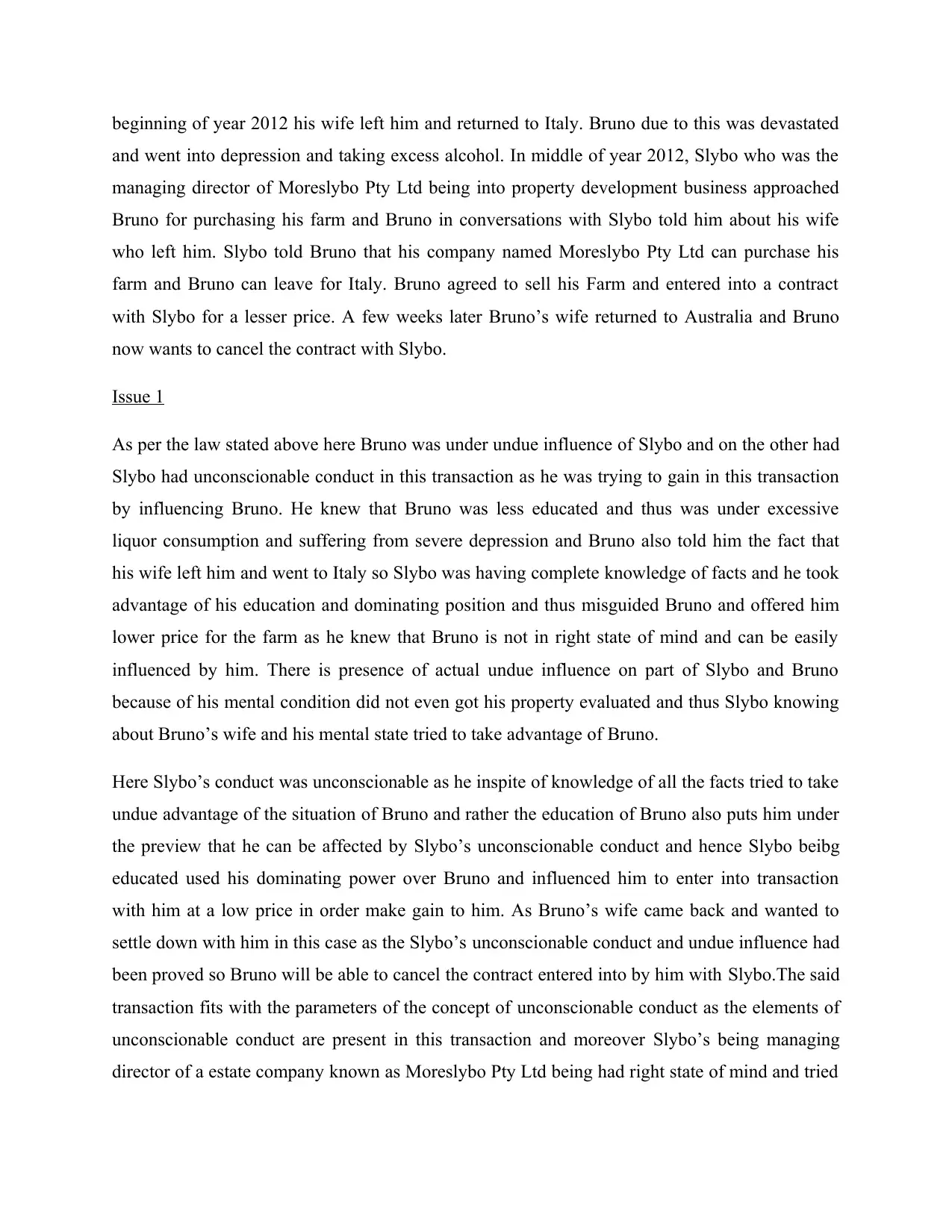
beginning of year 2012 his wife left him and returned to Italy. Bruno due to this was devastated
and went into depression and taking excess alcohol. In middle of year 2012, Slybo who was the
managing director of Moreslybo Pty Ltd being into property development business approached
Bruno for purchasing his farm and Bruno in conversations with Slybo told him about his wife
who left him. Slybo told Bruno that his company named Moreslybo Pty Ltd can purchase his
farm and Bruno can leave for Italy. Bruno agreed to sell his Farm and entered into a contract
with Slybo for a lesser price. A few weeks later Bruno’s wife returned to Australia and Bruno
now wants to cancel the contract with Slybo.
Issue 1
As per the law stated above here Bruno was under undue influence of Slybo and on the other had
Slybo had unconscionable conduct in this transaction as he was trying to gain in this transaction
by influencing Bruno. He knew that Bruno was less educated and thus was under excessive
liquor consumption and suffering from severe depression and Bruno also told him the fact that
his wife left him and went to Italy so Slybo was having complete knowledge of facts and he took
advantage of his education and dominating position and thus misguided Bruno and offered him
lower price for the farm as he knew that Bruno is not in right state of mind and can be easily
influenced by him. There is presence of actual undue influence on part of Slybo and Bruno
because of his mental condition did not even got his property evaluated and thus Slybo knowing
about Bruno’s wife and his mental state tried to take advantage of Bruno.
Here Slybo’s conduct was unconscionable as he inspite of knowledge of all the facts tried to take
undue advantage of the situation of Bruno and rather the education of Bruno also puts him under
the preview that he can be affected by Slybo’s unconscionable conduct and hence Slybo beibg
educated used his dominating power over Bruno and influenced him to enter into transaction
with him at a low price in order make gain to him. As Bruno’s wife came back and wanted to
settle down with him in this case as the Slybo’s unconscionable conduct and undue influence had
been proved so Bruno will be able to cancel the contract entered into by him with Slybo.The said
transaction fits with the parameters of the concept of unconscionable conduct as the elements of
unconscionable conduct are present in this transaction and moreover Slybo’s being managing
director of a estate company known as Moreslybo Pty Ltd being had right state of mind and tried
and went into depression and taking excess alcohol. In middle of year 2012, Slybo who was the
managing director of Moreslybo Pty Ltd being into property development business approached
Bruno for purchasing his farm and Bruno in conversations with Slybo told him about his wife
who left him. Slybo told Bruno that his company named Moreslybo Pty Ltd can purchase his
farm and Bruno can leave for Italy. Bruno agreed to sell his Farm and entered into a contract
with Slybo for a lesser price. A few weeks later Bruno’s wife returned to Australia and Bruno
now wants to cancel the contract with Slybo.
Issue 1
As per the law stated above here Bruno was under undue influence of Slybo and on the other had
Slybo had unconscionable conduct in this transaction as he was trying to gain in this transaction
by influencing Bruno. He knew that Bruno was less educated and thus was under excessive
liquor consumption and suffering from severe depression and Bruno also told him the fact that
his wife left him and went to Italy so Slybo was having complete knowledge of facts and he took
advantage of his education and dominating position and thus misguided Bruno and offered him
lower price for the farm as he knew that Bruno is not in right state of mind and can be easily
influenced by him. There is presence of actual undue influence on part of Slybo and Bruno
because of his mental condition did not even got his property evaluated and thus Slybo knowing
about Bruno’s wife and his mental state tried to take advantage of Bruno.
Here Slybo’s conduct was unconscionable as he inspite of knowledge of all the facts tried to take
undue advantage of the situation of Bruno and rather the education of Bruno also puts him under
the preview that he can be affected by Slybo’s unconscionable conduct and hence Slybo beibg
educated used his dominating power over Bruno and influenced him to enter into transaction
with him at a low price in order make gain to him. As Bruno’s wife came back and wanted to
settle down with him in this case as the Slybo’s unconscionable conduct and undue influence had
been proved so Bruno will be able to cancel the contract entered into by him with Slybo.The said
transaction fits with the parameters of the concept of unconscionable conduct as the elements of
unconscionable conduct are present in this transaction and moreover Slybo’s being managing
director of a estate company known as Moreslybo Pty Ltd being had right state of mind and tried
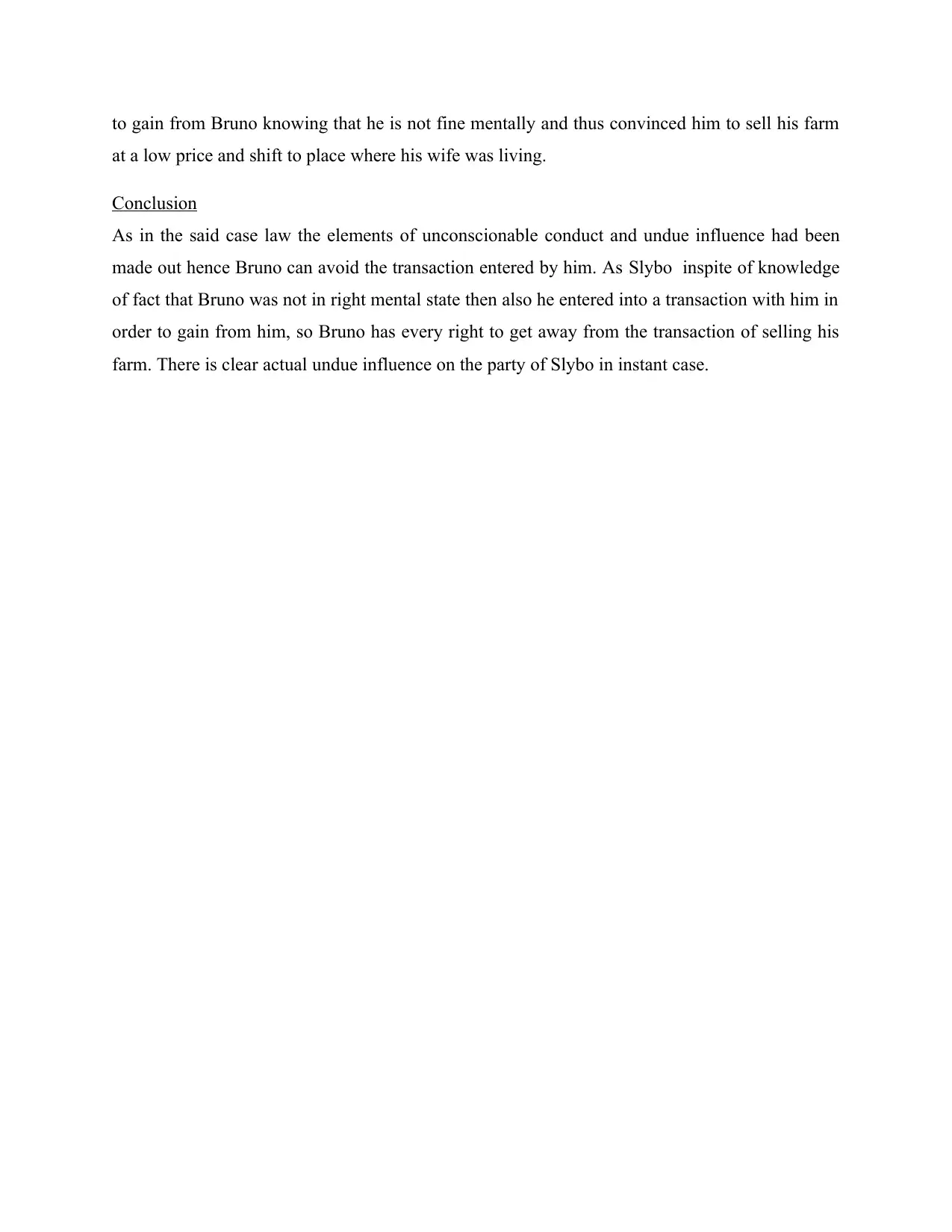
to gain from Bruno knowing that he is not fine mentally and thus convinced him to sell his farm
at a low price and shift to place where his wife was living.
Conclusion
As in the said case law the elements of unconscionable conduct and undue influence had been
made out hence Bruno can avoid the transaction entered by him. As Slybo inspite of knowledge
of fact that Bruno was not in right mental state then also he entered into a transaction with him in
order to gain from him, so Bruno has every right to get away from the transaction of selling his
farm. There is clear actual undue influence on the party of Slybo in instant case.
at a low price and shift to place where his wife was living.
Conclusion
As in the said case law the elements of unconscionable conduct and undue influence had been
made out hence Bruno can avoid the transaction entered by him. As Slybo inspite of knowledge
of fact that Bruno was not in right mental state then also he entered into a transaction with him in
order to gain from him, so Bruno has every right to get away from the transaction of selling his
farm. There is clear actual undue influence on the party of Slybo in instant case.
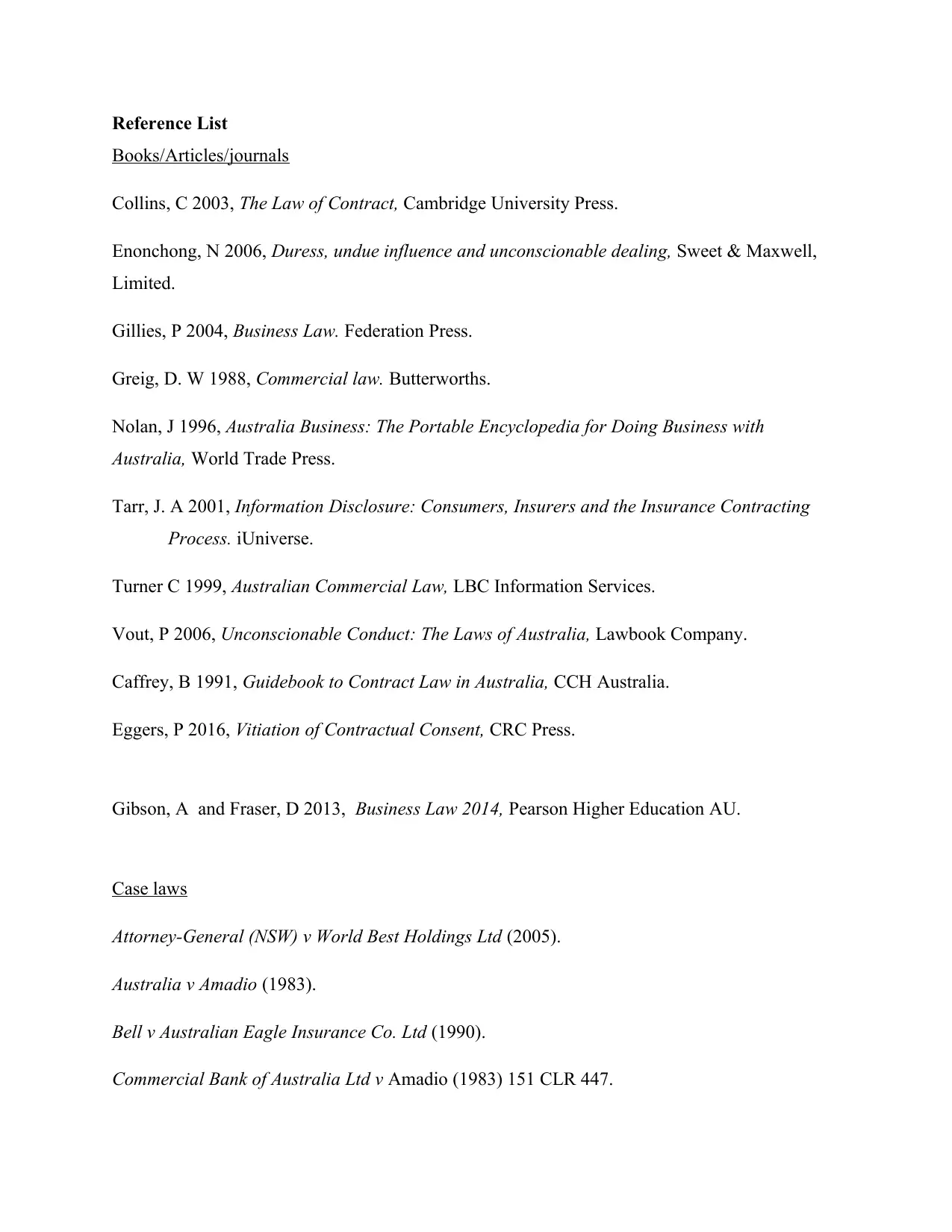
Reference List
Books/Articles/journals
Collins, C 2003, The Law of Contract, Cambridge University Press.
Enonchong, N 2006, Duress, undue influence and unconscionable dealing, Sweet & Maxwell,
Limited.
Gillies, P 2004, Business Law. Federation Press.
Greig, D. W 1988, Commercial law. Butterworths.
Nolan, J 1996, Australia Business: The Portable Encyclopedia for Doing Business with
Australia, World Trade Press.
Tarr, J. A 2001, Information Disclosure: Consumers, Insurers and the Insurance Contracting
Process. iUniverse.
Turner C 1999, Australian Commercial Law, LBC Information Services.
Vout, P 2006, Unconscionable Conduct: The Laws of Australia, Lawbook Company.
Caffrey, B 1991, Guidebook to Contract Law in Australia, CCH Australia.
Eggers, P 2016, Vitiation of Contractual Consent, CRC Press.
Gibson, A and Fraser, D 2013, Business Law 2014, Pearson Higher Education AU.
Case laws
Attorney-General (NSW) v World Best Holdings Ltd (2005).
Australia v Amadio (1983).
Bell v Australian Eagle Insurance Co. Ltd (1990).
Commercial Bank of Australia Ltd v Amadio (1983) 151 CLR 447.
Books/Articles/journals
Collins, C 2003, The Law of Contract, Cambridge University Press.
Enonchong, N 2006, Duress, undue influence and unconscionable dealing, Sweet & Maxwell,
Limited.
Gillies, P 2004, Business Law. Federation Press.
Greig, D. W 1988, Commercial law. Butterworths.
Nolan, J 1996, Australia Business: The Portable Encyclopedia for Doing Business with
Australia, World Trade Press.
Tarr, J. A 2001, Information Disclosure: Consumers, Insurers and the Insurance Contracting
Process. iUniverse.
Turner C 1999, Australian Commercial Law, LBC Information Services.
Vout, P 2006, Unconscionable Conduct: The Laws of Australia, Lawbook Company.
Caffrey, B 1991, Guidebook to Contract Law in Australia, CCH Australia.
Eggers, P 2016, Vitiation of Contractual Consent, CRC Press.
Gibson, A and Fraser, D 2013, Business Law 2014, Pearson Higher Education AU.
Case laws
Attorney-General (NSW) v World Best Holdings Ltd (2005).
Australia v Amadio (1983).
Bell v Australian Eagle Insurance Co. Ltd (1990).
Commercial Bank of Australia Ltd v Amadio (1983) 151 CLR 447.
Secure Best Marks with AI Grader
Need help grading? Try our AI Grader for instant feedback on your assignments.
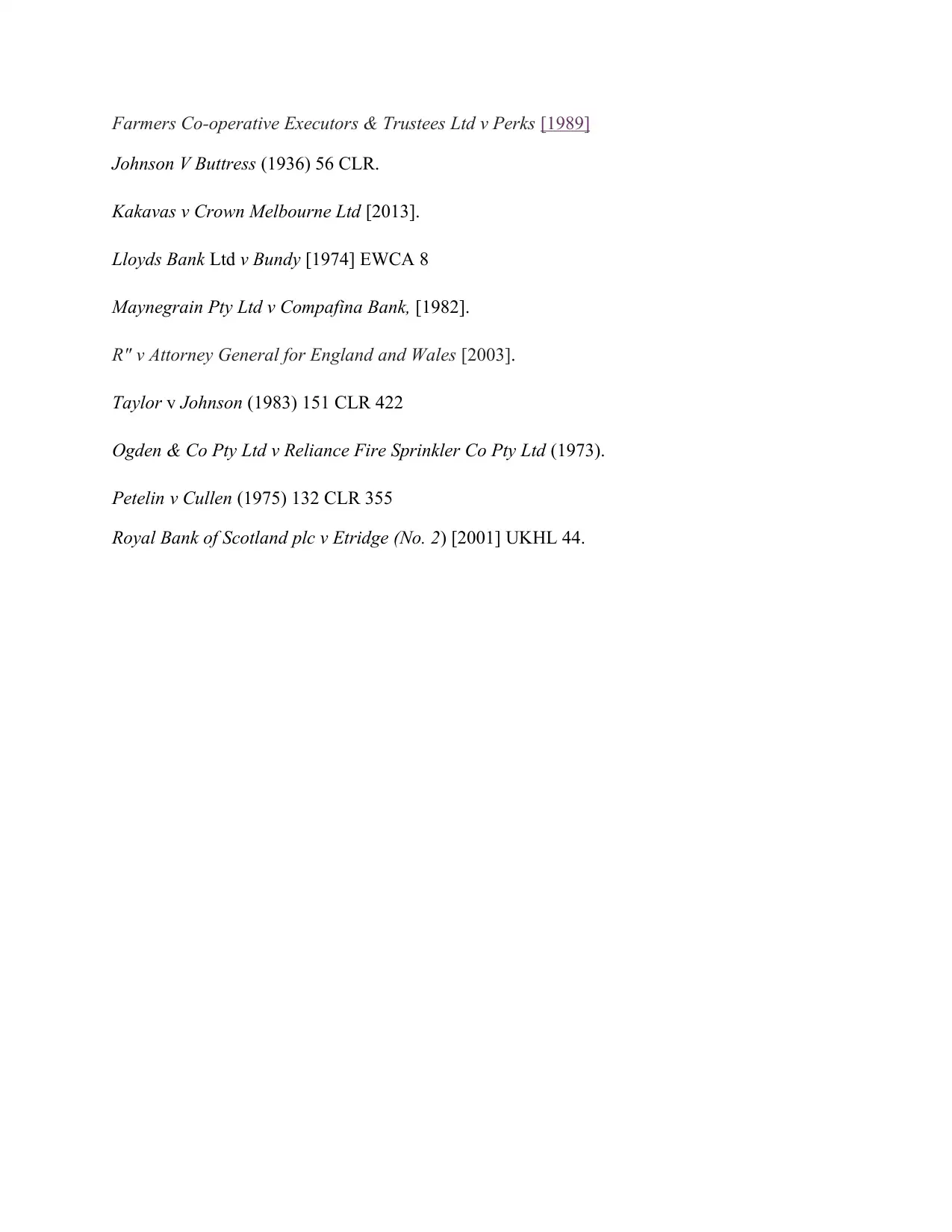
Farmers Co-operative Executors & Trustees Ltd v Perks [1989]
Johnson V Buttress (1936) 56 CLR.
Kakavas v Crown Melbourne Ltd [2013].
Lloyds Bank Ltd v Bundy [1974] EWCA 8
Maynegrain Pty Ltd v Compafina Bank, [1982].
R" v Attorney General for England and Wales [2003].
Taylor v Johnson (1983) 151 CLR 422
Ogden & Co Pty Ltd v Reliance Fire Sprinkler Co Pty Ltd (1973).
Petelin v Cullen (1975) 132 CLR 355
Royal Bank of Scotland plc v Etridge (No. 2) [2001] UKHL 44.
Johnson V Buttress (1936) 56 CLR.
Kakavas v Crown Melbourne Ltd [2013].
Lloyds Bank Ltd v Bundy [1974] EWCA 8
Maynegrain Pty Ltd v Compafina Bank, [1982].
R" v Attorney General for England and Wales [2003].
Taylor v Johnson (1983) 151 CLR 422
Ogden & Co Pty Ltd v Reliance Fire Sprinkler Co Pty Ltd (1973).
Petelin v Cullen (1975) 132 CLR 355
Royal Bank of Scotland plc v Etridge (No. 2) [2001] UKHL 44.
1 out of 11
Related Documents
Your All-in-One AI-Powered Toolkit for Academic Success.
+13062052269
info@desklib.com
Available 24*7 on WhatsApp / Email
![[object Object]](/_next/static/media/star-bottom.7253800d.svg)
Unlock your academic potential
© 2024 | Zucol Services PVT LTD | All rights reserved.




